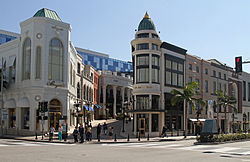Beverly Hills, California
| Beverly Hills, California | |||||
|---|---|---|---|---|---|
| General law city | |||||
| City of Beverly Hills | |||||

Beverly Hills at the corner of Rodeo Drive and Via Rodeo in 2012.
|
|||||
|
|||||
| Nickname(s): "Garden Spot of the World", "B.H.", "Bev Hills", "90210" | |||||
 Location of Beverly Hills in Los Angeles County, California |
|||||
 Aerial view, 3D computer generated image |
|||||
| Location in the United States | |||||
| Coordinates: 34°4′23″N 118°23′58″W / 34.07306°N 118.39944°WCoordinates: 34°4′23″N 118°23′58″W / 34.07306°N 118.39944°W | |||||
| Country | |||||
| State |
|
||||
| County |
|
||||
| Incorporated | January 28, 1914 | ||||
| Named for | Beverly Farms | ||||
| Government | |||||
| • Type | Council-manager | ||||
| • Mayor | John A. Mirisch | ||||
| • Vice mayor | Nancy H. Krasne | ||||
| • City council | William W. Brien, M.D. Lili Bosse Julian A. Gold, M.D. |
||||
| • Interim city manager | Mahdi Aluzri | ||||
| Area | |||||
| • Total | 5.710 sq mi (14.790 km2) | ||||
| • Land | 5.708 sq mi (14.784 km2) | ||||
| • Water | 0.002 sq mi (0.006 km2) 0.04% | ||||
| Elevation | 259 ft (79 m) | ||||
| Population (April 1, 2010) | |||||
| • Total | 34,109 | ||||
| • Estimate (2013) | 34,658 | ||||
| • Density | 6,000/sq mi (2,300/km2) | ||||
| Time zone | Pacific (UTC−8) | ||||
| • Summer (DST) | PDT (UTC−7) | ||||
| ZIP codes | 90209–90213 | ||||
| Area codes | 310/424, 323 | ||||
| FIPS code | 06-06308 | ||||
| GNIS feature IDs | 1652672, 2409840 | ||||
| Website | www |
||||
Beverly Hills is a city in Los Angeles County, California, United States, surrounded by the cities of Los Angeles and West Hollywood. Originally a Spanish ranch where lima beans were grown, Beverly Hills was incorporated in 1914 by a group of investors who had failed to find oil, but found water instead and eventually decided to develop it into a town. By 2013, its population had grown to 34,658. Sometimes referred to as "90210", one of its primary ZIP codes, it was home to many actors and celebrities throughout the 20th century. The city includes the Rodeo Drive shopping district and the Beverly Hills Oil Field.
Gaspar de Portolá arrived in the area that would become Beverly Hills on August 3, 1769, travelling along native trails which followed the present-day route of Wilshire Boulevard.
The area was settled by Maria Rita Quinteros de Valdez and her husband in 1828. They called their 4,500 acres (18 km2) of property the Rancho Rodeo de las Aguas. in 1854, she sold the ranch to Benjamin Davis Wilson (1811–1878) and Henry Hancock (1822–1883). By the 1880s, the ranch had been subdivided into parcels of 75 acres (0.30 km2) and was being rapidly bought up by anglos from Los Angeles and the East coast.
Henry Hammel and Andrew H. Denker acquired most of it and used it for farming lima beans. At this point, the area was known as the Hammel and Denker Ranch. By 1888, Denker and Hammel were planning to build a town called Morocco on their holdings.
In 1900, Burton E. Green, Charles A. Canfield, Max Whittier, Frank H. Buck, Henry E. Huntington, William G. Kerckhoff, William F. Herrin, W.S. Porter, and Frank H. Balch, formed the Amalgamated Oil Company, bought the Hammel and Denker ranch, and began looking for oil. They did not find enough to exploit commercially by the standards of the time, though. In 1906, therefore, they reorganized as the Rodeo Land and Water Company, renamed the property "Beverly Hills," subdivided it, and began selling lots. The development was named "Beverly Hills" after Beverly Farms in Beverly, Massachusetts and because of the hills in the area. The first house in the subdivision was built in 1907, although sales remained slow.
...
Wikipedia




